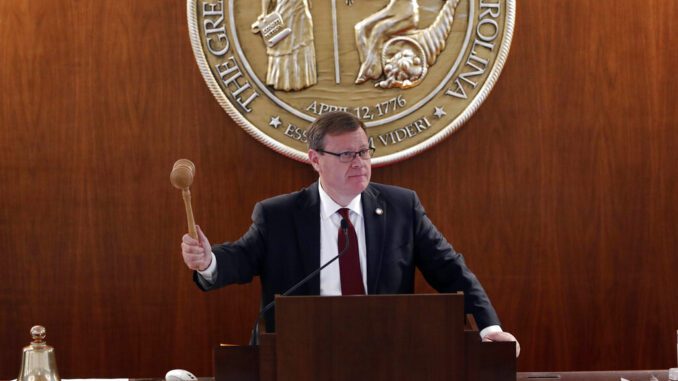
RALEIGH — The North Carolina House of Representatives is taking legislative steps to make masks optional statewide for K-12 school children.
A conference committee substitute for Senate Bill 173, the Free the Smiles Act, will be introduced at a meeting of the House K12 Education Committee. Due to procedures, no amendments can be added and a simple up and down vote will be taken.
The conference substitute contains four main provisions, with the first affirming a parent’s authority to make decisions on their children’s health and education by allowing parents to opt their children out of face covering requirements in public school units.
Parents will be given the ability to opt-out of masking for their children that will be effective upon the passage of the bill and the governor signing it. The ability to opt-out will also apparently extend to the 2022-23 school year.
Another provision protects students from retribution or retaliation by prohibiting school employees from treating children not wearing face coverings differently than children who are wearing face coverings. Areas included in this section are classroom assignments, course assignments, non-academic portions of the school day, extracurricular activities, student discipline, and academic grading.
The provision is likely alluding to reports of children in other states such as Virginia being harassed by school staff and even being threatened with charges of trespassing. Other reports have seen students segregated from classes by being forced into cafeterias or locked in a room or gym area.
Parents will not have to submit any type of paperwork, but rather just send their child to school without a mask.
The conference committee report repeals a requirement in previous legislation requiring school districts to adopt a mask policy and revisit that policy on a monthly basis for the 2021-22 school year.
Additionally, the measure will “limit the liability for public school units when allowing parental opt-out of face covering requirements, unless the act or omission amounts to gross negligence, willful or wanton conduct, or intentional wrongdoing.”
In keeping with the Centers for Disease Control orders, the only place a mask is required is on school transportation.
The House committee met as around 17 districts in the state had voted to go mask optional in the last 8 days. Currently, 57 of the state’s 115 districts are mask optional, although a handful of of those include stipulations such as masking based on infection rates or masking on a school by school basis.
Charlotte Mecklenburg schools could be joining the mask optional list.
On the evening of Feb. 17, Charlotte Mecklenburg County commissioners unanimously voted to end the county’s mask mandate. The county’s new health director Raynard Washington said he plans to encourage schools to start planning to go mask optional. The Charlotte Mecklenburg School District is the second-largest in the state, just behind Wake County. Despite protests from parents and students, the Wake County school board has refused to hold a mask vote until next month.
In a Feb. 16 press release announcing the upcoming K12 Education Committee meeting, Moore criticized Governor Roy Cooper who said last week that the N.C. Department of Health and Human Services would be updating the guidance for K-12 schools known as the StrongSchools NC toolkit, but that “the only update to the toolkit was to contact tracing.”
The toolkit’s updates did not include any changes to masking and continue to tie the use of masks in schools to community transmission rates set by the Centers for Disease Control.
“Let me be clear: It’s parents, not politicians who should be making these decisions for their children. As other states across the country lift mask mandates and restrictions, North Carolina’s children will not be left behind,” North Carolina House Speaker Tim Moore (R-Kings Mountain) said in a statement prior to the legislation discussion.
Moore continued, “Confusing guidance from politicians has kept student masking policies in place, despite the fact that children are the demographic with the lowest risk, cases are plummeting, and the data has shown the learning loss and delays that have resulted from ongoing restrictions. It is time to return this decision back to parents, where it belongs.”
North Carolina State Superintendent Catherine Truitt tells North State Journal she’d like to see masking become a choice for parents at this point.
“We have such high rates of immunity, and I think a lot of parents have mask fatigue on behalf of their children,” Truitt said. “I would ask they [decision-makers enacting mask mandates] listen to parents. Parents are at a place where they are more interested in deciding for themselves if they want their child to mask rather than there being a district-wide mandate. But at the end of the day, a local board of education has the decision to not require masks.”
Truitt also said she thinks it is time the StrongSchools NC toolkit be retired.
“With the new changes that will be voted on in March by the SBOE, which eliminate the requirement for contact tracing, I think it’s time for the Toolkit to be something that just provides data to districts that allows them to make informed decisions,” said Truitt.



